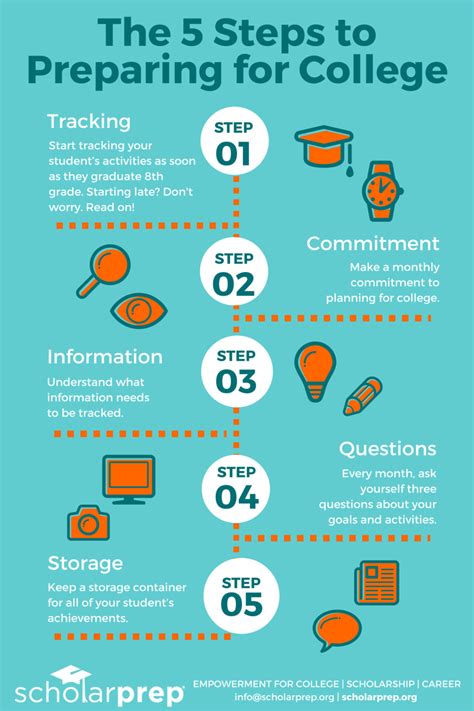Preparing for college is a monumental task that requires careful planning and execution. The decisions you make now will have a significant impact on your success in higher education and beyond. To ensure a smooth transition and a rewarding college experience, consider the following comprehensive guide:

Academic Preparation
Hone Your Study Skills
- Develop Strong Reading Habits: Cultivate a habit of reading extensively and critically. Engage in deep reading, analyzing texts, and synthesizing information.
- Master Note-Taking Techniques: Learn effective note-taking methods, such as the Cornell system or mind mapping, to condense and organize complex material.
- Practice Active Learning: Engage in active learning techniques, such as creating flashcards, teaching concepts to peers, or summarizing lecture notes.
Strengthen Your Core Subjects
- Review Math and Science: Refresh your knowledge in mathematics, science, and other core subjects. Take practice tests and consult textbooks to ensure a solid foundation.
- Enroll in Advanced Placement or International Baccalaureate Courses: Challenge yourself with rigorous coursework that aligns with your academic goals and college major.
- Seek Extra Tutoring: If you encounter difficulties in any subject, don’t hesitate to seek additional support from tutors or teachers.
Personal Development
Explore Your Interests
- Join extracurricular activities: Participate in sports, clubs, or organizations that align with your passions and interests. These experiences will help you discover your talents and connect with like-minded individuals.
- Pursue Independent Projects: Embark on self-directed projects, such as volunteering, research, or creative endeavors, that demonstrate your initiative and curiosity.
- Develop Leadership Skills: Take on leadership roles within extracurricular activities, community organizations, or part-time jobs to cultivate communication and teamwork abilities.
Build a Strong Support System
- Connect with Mentors: Establish relationships with mentors, such as teachers, counselors, or industry professionals, who can provide guidance and encouragement throughout your college journey.
- Foster Peer Relationships: Build positive relationships with classmates, friends, and family members who can offer support and motivation.
- Seek Professional Help When Needed: Don’t hesitate to seek professional help if you experience anxiety, stress, or other mental health concerns that may hinder your college preparation.
College Research
Explore College Options
- Visit Campuses: Attend college tours and open houses to get a firsthand experience of different campuses and academic offerings.
- Research Majors and Programs: Thoroughly research college majors and programs that align with your career goals and interests. Consider factors such as curriculum, faculty, and research opportunities.
- Attend College Fairs: Participate in college fairs to meet representatives from various colleges and universities and gather information about their programs and admission requirements.
Apply for Admission
- Prepare for Standardized Tests: Dedicate ample time to preparing for the SAT or ACT exam. Practice regularly and consider taking preparatory courses or seeking professional tutoring.
- Write Compelling Essays: Craft thoughtful and engaging essays that showcase your writing skills, critical thinking abilities, and personal qualities.
- Gather Strong Letters of Recommendation: Request letters of recommendation from teachers, counselors, or employers who can attest to your academic abilities, character, and work ethic.
Common Mistakes to Avoid
- Underestimating the Importance of Academic Preparation: Assuming that you can catch up in college can lead to academic difficulties and stress.
- Ignoring Personal Development: Failing to develop your soft skills, such as leadership and communication, can hinder your success in college and beyond.
- Rushing the College Application Process: Applying to college without thorough research and preparation can lead to missed opportunities or admission to less-than-optimal institutions.
- Ignoring Financial Aid: Not exploring financial aid options can result in unnecessary financial burdens or missed opportunities to attend your dream college.
Why Matters
Preparing for college is not merely a task but an investment in your future. By following these strategies, you will:
- Improve Your Academic Performance: Strong preparation ensures a smoother transition to college-level coursework and reduces the risk of academic struggles.
- Enhance Your Personal Growth: Engaging in extracurricular activities, pursuing independent projects, and building a support system foster personal development and well-being.
- Maximize Your College Options: Thorough research and preparation expand your options, increasing your chances of admission to the college that best suits your needs.
- Prepare for a Successful Future: The skills and knowledge acquired through college preparation lay the foundation for a fulfilling career and a meaningful life.
Additional Resources
- College Board: https://www.collegeboard.org/
- National Association for College Admission Counseling: https://www.nacacnet.org/
- American College Testing: https://www.act.org/
- Federal Student Aid: https://studentaid.gov/
Conclusion
Preparing for college is a multi-faceted endeavor that requires a proactive and comprehensive approach. By embracing these strategies, you will not only enhance your chances of admission to your dream college but also embark on a transformative journey that will shape your future success. Remember, the time and effort you invest now will reap immeasurable rewards in the years to come.
